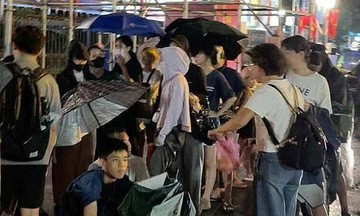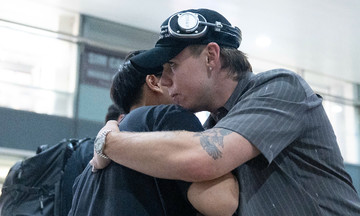On 27/6, literary website LitHub published a letter from 70 authors to major publishing houses including Penguin Random House, HarperCollins, Simon & Schuster, Hachette Book Group, and Macmillan. The authors urged these companies to refrain from using AI in any stage of the publishing process.
Within 24 hours, the accompanying petition garnered over 1,100 signatures, including prominent figures in American literature such as Jodi Picoult, Olivie Blake, and Paul Tremblay. NPR reported contacting the five aforementioned publishers, but only Simon & Schuster responded. A representative stated the company would protect authors' intellectual property rights and seriously consider the authors' requests.
 |
Three of the authors who signed the letter. From left: Olivie Blake, Paul Tremblay, and Jodi Picoult. Photo: Cosmopolitan, Paul Tremblay, CNN |
In the letter, the authors demanded publishers commit to: not publishing books written or designed by AI, not replacing human staff with AI, and not relegating editors to merely proofreading AI-generated text. They stated they would incorporate these terms into their publishing contracts.
The 70 authors emphasized that AI-generated books are "cheap creations stemming from intellectual theft." They argued that while AI is a useful tool for the future, it has no place in literature or art.
"An artist's core mission is to reflect human life, but in today's fast-paced world, our art is becoming commodified. We are entering a future where books and stories might be written by AI, which doesn't understand suffering or love. We write from our own lives, from the pain of losing parents, the joy of childbirth, or past loves. These stories are being stolen to train AI models, and if human greed prevails, AI-generated works will soon flood bookshelves," the letter stated.
In recent years, numerous AI-generated books, often mimicking original works but attributed to fake human authors, have appeared on platforms like Amazon. Wired cited the example of AI researcher Melanie Mitchell. When searching for her book, "Artificial Intelligence: A Guide for Thinking Humans," she found an identical ebook title. The 45-page book, written in a clumsy and verbose style, was attributed to a non-existent author named Shumaila Majid, with no biography or profile picture. Tech company Reality Defender concluded with 99% certainty that the book was AI-generated. Amazon promptly removed the copy.
Scientist Fei-Fei Li's book, "The Worlds I See: Curiosity, Exploration, and Discovery in the Age of AI," experienced a similar situation.
The authors also argued that the rise of AI voice generation and machine translation is displacing voice actors, editors, and book translators. They cited Audible's May announcement to partner with publishers to release AI-narrated and translated audiobooks. This decision sparked backlash from writers, translators, and voice actors, with author Joanne Harris calling it "short-sighted."
Young adult author Rioghnach Robinson believes publishers should do more to protect writers from the AI wave.
The use of AI in publishing has become a contentious issue. Indian author Salman Rushdie has stated that "writing as a profession will be threatened if AI can one day write a funny book." In March, the Society of Authors (SoA) urged the UK government to hold Meta accountable for allegedly using their books to illegally train its Llama 3 AI model. Anthropic AI is facing similar legal action.
Conversely, some remain optimistic about the future of publishing. On 12/3, Sam Altman, CEO of OpenAI, the company behind ChatGPT, stirred controversy by posting an AI-written short story titled "A machine-shaped hand." On X, he described it as "capturing the feel of great sci-fi." In Japan, Kohkoku magazine published a work 95% written by ChatGPT, set in a post-apocalyptic world. Writer Rie Kudan, who guided the AI and wrote the remaining 5%, said the experience made her reflect on the meaning of writing fiction.
Chau Anh (via NPR)











